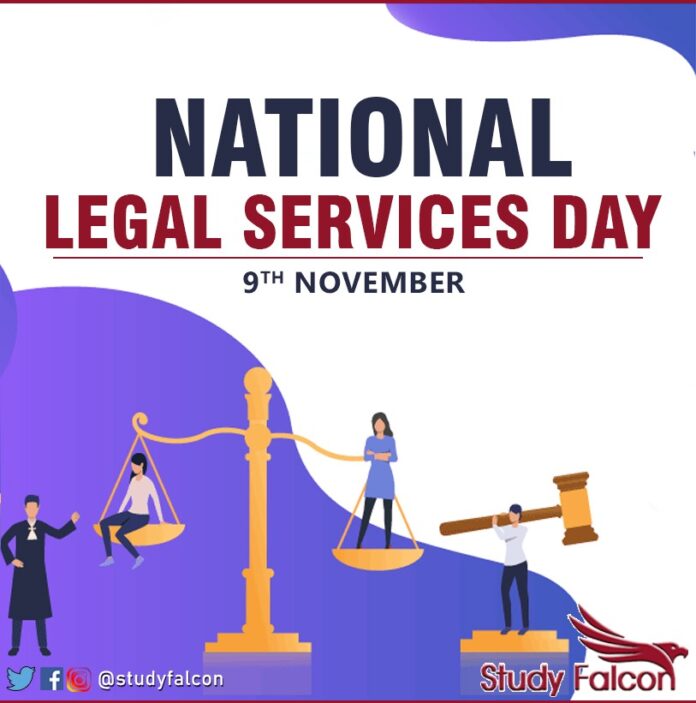Legal Services Day is celebrated on 9th of November every year. The objective of this celebration is to spread awareness among the general public about the fair and just practices of the Indian Judiciary. On this day, variety of legal literacy camps and functions, related to the Legal Services Day, are organized in the capital city of the country. People from government as well as non-governmental organizations partake in them.
A lot of people do not want to get embroiled in the legalities and often look at the procedures as a mess to deal with. But justice is an important quality that needs to be procured in a society. Thus, legal services and the facility to use them are of great importance. The law in Indian constitution treats everyone with a fair eye and promotes justice on a basis of equal opportunity. An observance of this day also promotes the idea of seeking legal help and spreading awareness about legal systems.
It has also been stated that the students and children of the early age should be aware about the constitutional rights and laws relating to them. There is also need to be aware about the child labor and old parents by opening the welfare centers.
The National Legal Services Day commemorates The Legal Services Authorities Act 1987 of the Indian Parliament which came into effect on 9th November, 1995. This day was first started by the Supreme Court all across India to offer help and support to the weaker and poor sections of people which may be women, disabled persons, Scheduled Tribes, children, Scheduled Castes, human trafficking victims as well as natural calamities victims.
The National Legal Services Authority (NALSA) was constituted under the Legal Services Authorities Act, 1987. The prime objective of NALSA is speedy disposal of cases and reducing the burden of the judiciary. Other objectives are spreading Legal Awareness, organizing Lok Adalats. promoting dispute settlements, and providing the victims of crime with compensation. They were to organize Lok Adalats for amicable settlement of disputes. The Chief Justice of India serves as the Patron-in-Chief NALSA. The second senior most Judge of Supreme Court of India serves as the Executive Chairman of the Authority. Legal Service Day is celebrated to make people aware of the various provisions under the Legal Services Authorities Act and the right of the litigants.
The state government has supported and cooperated a lot by granting the funds needed for the State Legal Service Authority (SLSA) operations. At the state level, the State Legal Services Authority has been constituted to give effect to the policies of NALSA at the state level, and also to conduct Lok Adalats in the states. NALSA provides funds for the State Legal Services Authority for the implementation of the various legal aids and programmes. At the district level also, the District Legal Services Authority has been established. Taluk Legal Services Committees are also constituted for each of the Taluk or Mandal or for a group of Taluk or Mandals to coordinate the activities of legal services in the Taluk and to organise Lok Adalats. Every Taluk Legal Services Committee is headed by a senior Civil Judge operating within the jurisdiction of the Committee who is its ex-officio Chairman.
Article 39 A of the Constitution of India provides for free legal aid to the poor and weaker sections of the society, to promote justice on the basis of equal opportunity. Article 14 and Article 22 (1), obligate the State to ensure equality before the law and a legal system which promotes justice on a basis of equal opportunity to all. Legal aid strives to ensure that constitutional pledge is fulfilled in its letter and spirit and equal justice is made available to the poor, downtrodden and weaker sections of the society.
In carrying out all these responsibilities, NALSA works in close coordination with the various State Legal Services Authorities, District Legal Services Authorities and other agencies for a regular exchange of relevant information, monitoring and updating on the implementation and progress of the various schemes in vogue and fostering a strategic and coordinated approach to ensure smooth and streamlined functioning of the various agencies and stakeholders.
Thus, it can be noted that the role played by NALSA and its networks is very much relevant to achieving the Sustainable Development Goal-16 , which seeks to promote peaceful and inclusive societies for sustainable development, provide access to justice for all and build effective, accountable and inclusive institutions at all levels.










